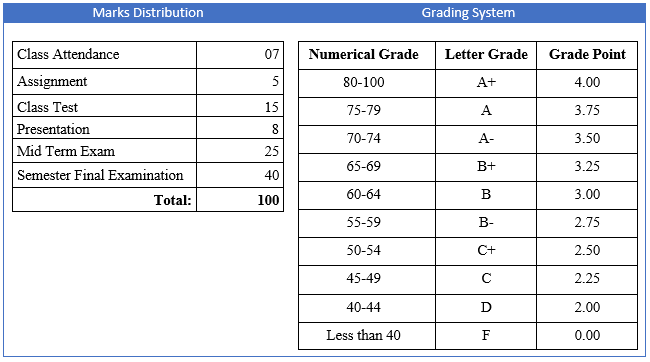Section outline
-

-
Instructor : Saima Afrin
Designation: Lecturer
Email: saima.cse@diu.edu.bd
Contact No: 01550552385
Office: Room no 505, building- AB4, Daffodil International University, Permanent Camous, Ashulia.
DIU Web Profile: https://faculty.daffodilvarsity.edu.bd/profile/cse/afrin-cse.html
-
The computer lies at the heart of computing. Without it most of the computing today would be a branch of theoretical mathematics. To be a professional in any field of computing today, one should not regard the computer as just a black box that executes programs by magic. All students of computing should acquire some understanding and appreciation of a computer system’s functional components, their characteristics, their performance, and their interactions. This course can help the students in this regard.
-
The objective is to enable the students to understand computer architecture in order to structure a program so that it runs more effectively on a real machine. Also, to provide an insight in selecting a system to use and to make them able to understand the trade-off among various components such as CPU clock speed vs memory size.
-
-
-
Topics of Discussion:
* The term Computer architecture & organization and differences between them.
* High-level structures & functions of computers.
* Evolution of computers, Performance evaluation of computing systems.
Expected Learning Outcomes:
* Identify the basics organization of a computing system.
* Differentiate between the concept of architecture and organization.
Resources of Learning:
* Lesson 1: Introduction and Overview.
* Lesson 2: History of Computing.
-
Lecture Slide of Chapter 1
-
-
-
-
-
Topics of Discussion:
* The evolution of computers
* Mechanical computers
* Electrical computers
* Babbage's analytical engine
Expected Learning Outcomes:
* Identify the differences between electrical & mechanical computers
* Understand the structure of the analytical engine
* Understand the phases of computer evolution
Resources of Learning:
* Lesson 3: Comparison between electrical and mechanical computers.
* Lesson 4: Evolution of computers.
-
-
-
-
-
Class Task-1
-
Opened: Friday, 4 March 2022, 1:00 PMDue: Saturday, 5 March 2022, 12:00 PM
-
-
Topics of Discussion:
* The performance evaluation of computers
* Details of first-generation computers
* Details of second-generation computers
* Details of third-generation computers
* Details of fourth-generation computers
Expected Learning Outcomes:
* Understand to evaluate the performance of first-generation computers.
* Understand to evaluate the performance of second-generation computers.
* Understand to evaluate the performance of third-generation computers.
* Understand to evaluate the performance of fourth-generation computers.
Resources of Learning:
* Lesson 5: Performance evaluation of computing systems.
* Lesson 6: Continuation of Performance evaluation of computing systems.
-
Chap-1: Lesson-5
* Video Lecture (PC-B-13.10.20)* Video Lecture (PC-Retake: 17.10.20) [Quiz & Presentation Discussion]
-
-
-
Topics of Discussion:
- System representation and design process.
- Register and gate-level design.
Expected Learning Outcomes:
- Introduction to system representation, behavior and function of systems, and design process.
- Learn different types of design processes and levels.
Resources of Learning:
- Lesson 7: System representation and design process.
- Lesson 8: Register and gate-level design.
-
Lecture Slide of Chapter-2
-
-
-
QUIZ-1
-
Opened: Friday, 1 April 2022, 8:03 PMClosed: Friday, 1 April 2022, 8:42 PM
Before you attempt, read the instructions carefully--
- Time is 35 min, Number of question is 15
- You will get total 5 pages, each page containing 3 questions.
- You have to answer the questions sequentially. You can't skip any question.
- If you skip any question/page and go forward to the next page then you won't be able to perform them again means you can't go backward!
- Questions and answers all will be shuffled
- You will have 2 attempt for this quiz.
-
Topics of Discussion:
- Processor-level design components.
- Memory organization and System interconnection.
Expected Learning Outcomes:
- Learn different components of processor level design.
- Recognize the concept of cache memory in modern computers.
- Identify and differentiate among various system interconnection.
Resources of Learning:
- Lesson 9: Processor level design.
- Lesson 10: Continuation of Processor level design.
-
Topics of Discussion:
* Computer data representation for numbers and characters.
* Computer numbers encoding.
Expected Learning Outcomes:
* Learn different computer numbers representation and conversion.
* Recognize the concept of encoding and data representation.
Resources of Learning:
* Lesson 7: Data representation and encoding.
* Lesson 8: Review on Mid Term Topics.
-
Lecture Slide of Chapter-3
* Chapter-3 -
-
-
-
-
MID-TERM EXAMINATION Syllabus & Instruction
- Syllabus : Week-1 to week-6
- Instruction for Online Examination
- Question (Given below)
- Submission of Answer Scripts
-
Mid Question Fall-20 (Click to Download)
Answer Script
-
Opened: Wednesday, 13 April 2022, 2:00 PMDue: Wednesday, 13 April 2022, 6:00 PM
- Name your answer script as ID_CSE322_MID_Fall20 (Ex: 192-15-2020_CSE322_MID_Fall20)
- Must be submit in pdf form.
- Do not exceed the file size than 10mb.
-
Opened: Wednesday, 13 April 2022, 2:00 PMDue: Wednesday, 13 April 2022, 6:00 PM
- Name your answer script as ID_CSE322_MID_Fall20 (Ex: 192-15-2020_CSE322_MID_Fall20)
- Must be submit in pdf form.
- Do not exceed the file size than 10mb.
-
-
Topics of Discussion:
- Instruction set characteristics
- Basic CPU design
- Processor Basics
Expected Learning Outcomes:
- Enhance the concept of instruction sets in modern computers.
- Identify the characteristics and functions of instruction sets.
Resources of Learning:
- Lesson 13: Instruction set characteristics.
- Lesson 14: Basic CPU design.
-
-
-
-
-
Class Task-2
-
Topics of Discussion:
- CPU design with ASM chart and Flowchart.
- Endian mode types.
- Discussion on Addressing modes with examples.
- Discussion on RISC and CISC processor.
Expected Learning Outcomes:
- Realize the concept of ASM chart & flowchart design of the CPU.
- Understand the Little and Big Endian modes and their purposes.
- Identify different Addressing modes, their types, and learn about their operation.
- Enhance the concept of processor functionalities.
Resources of Learning:
- Lesson 15: Continuation of Basic CPU design.
- Lesson 16: Addressing modes and types of operations.
-
Topics of Discussion:
- Pipelining strategy and performance.
- Pipelining Timing diagram analysis with ideal & conditional or unconditional branching cases.
- Pipeline hazards and measures against pipeline hazards.
Expected Learning Outcomes:
- Realize the concept of instruction pipelining in modern computers.
- Appreciate the importance of pipelining in computer processing.
- Identify various pipeline hazards and their possible remedies.
Resources of Learning:
- Lesson 17: Pipelining strategy, performance.
- Lesson 18: Pipeline hazards and measures against pipeline hazards.
-
Lecture Slide of Chapter-6
* Chapter-6 -
-
-
Topics of Discussion:
- Concept of Cache Memory
- Memory hierarchy
- Cache Memory Mapping
- Replacement algorithm
Expected Learning Outcomes:
- Recognize the concept of cache memory in modern computers.
- Ability to differentiate the term Memory and Storage.
- Able to learn and identify the different cache memory mapping concept.
- Able to understand how the replacement algorithm works.
Resources of Learning:
- Lesson 19: Memory hierarchy and introduction to cache memory.
- Lesson 20: History of Computing.
-
Lecture Slide of Chapter-7
* Chapter-7 -
-
-
Topics of Discussion:
- Introducing the concept of Virtual Memory.
- Virtual Memory Mapping process and Address translation.
- Swap in and Swap out.
- Concept of Paging and page table.
Expected Learning Outcomes:
- A clear understanding of the working procedure of virtual memory.
- Able to understand how to address translation works.
- Learn the concept of paging and page tables.
Resources of Learning:
- Lesson 21: Introduction to virtual memory.
- Lesson 22: Demand Paging.
-
Lecture Slide of Chapter-8
* Chapter-8 -
-
-
Lesson 23: Presentation and Open-Ended discussion.
Lesson 24: Review of Final exam topics.
-
Opened: Saturday, 14 May 2022, 8:00 PMClosed: Saturday, 14 May 2022, 8:40 PM
Before you attempt, read the instructions carefully--
- Time is 30 min, Number of question is 15
- You will get total 5 pages, each page containing 4 questions.
- You have to answer the questions sequentially. You can't skip any question.
- If you skip any question/page and go forward to the next page then you won't be able to perform them again means you can't go backward!
- Questions and answers all will be shuffled
- You will have 2 attempt for this quiz.
-
Opened: Friday, 20 May 2022, 7:00 PMClosed: Friday, 20 May 2022, 7:35 PM
Before you attempt, read the instructions carefully--
- Time is 30 min, Number of question is 15
- You will get total 4 pages, each page containing 4 questions.
- You have to answer the questions sequentially. You can't skip any question.
- If you skip any question/page and go forward to the next page then you won't be able to perform them again means you can't go backward!
- Questions and answers all will be shuffled
- You will have 2 attempt for this quiz.
-
-
-
Opened: Wednesday, 6 April 2022, 1:00 AMDue: Friday, 8 April 2022, 11:59 PM
Submit Your Presentation Here
-


